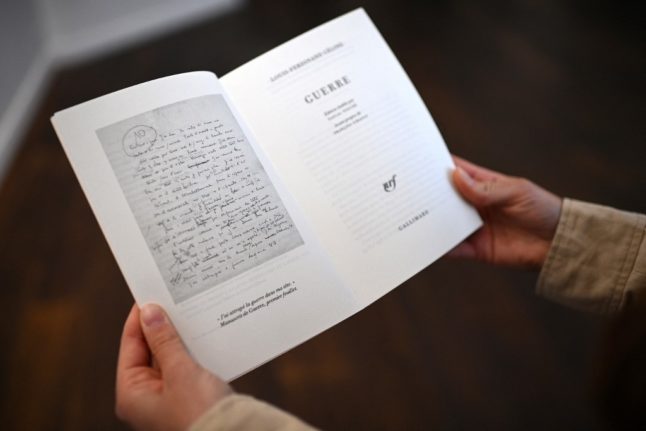LITERATURE
Five things to know about the Nobel Literature Prize
The Swedish Academy, which awards the Nobel Literature Prize, has been in turmoil ever since an influential cultural figure – the husband of one of its 18 members – was accused of sex crimes during last year's #MeToo campaign.
Published: 4 May 2018 17:53 CEST

Mo Yan, the 2012 winner of the Nobel Prize for Literature collects his prize. Photo: Henrik Montgomery/AP/Scanpix
The institution said on Friday it was postponing this year's prize due to reduced public confidence in the academy after several members resigned over the scandal.
Here are five things to know about the Nobel Literature Prize.
Most prestigious award
Each year, the Swedish Academy awards 16 prizes, the most famous and prestigious being the Nobel Literature Prize.
In his 1895 last will and testament, Swedish scientist and philanthropist Alfred Nobel tasked the institution with awarding the Nobel Literature Prize each year.
Since 1901, four or five of the Academy's 18 members have been elected to serve on its Nobel Committee for a three-year term, designated to sort through the nominations and provide the rest of the Academy with a shortlist of possible winners.
The nominees' bodies of work are then studied and discussed by the entire Academy. The members hold a vote in October to choose the winner – the laureate must obtain more than half of the votes cast.
350 nominees a year
The Academy's archives are bursting with letters from the world's most renowned literary figures nominating candidates. Each year, the institution receives around 350 nominations submitted by those eligible to do so: former Nobel literature laureates, members of other countries' equivalent academies, literature professors, and the heads of national writers' associations.
Each one vaunts the talents of their candidate, some going so far as to slip in a little gift for Academy members … a gesture they typically frown upon.
To be valid, nominations must be presented or renewed each year, and must be received by the Academy by January 31 at the latest.
To qualify, nominees must still be alive, and, according to the strict rules laid out by Alfred Nobel, must have published a piece of work within the past year, though the Academy has occasionally strayed from that requirement.
Seven reserved years, two refusals
A total of 114 people have won the Nobel Literature Prize. The prize has been awarded on 110 occasions, with two people sharing the prize on four occasions. It has also been declined twice: In 1958 Russian author Boris Pasternak accepted the prize but was later forced by Soviet authorities to decline it, and in 1964, French philosopher Jean-Paul Sartre turned it down.
The institution, founded in 1786, has on seven previous occasions chosen to reserve the prize: in 1915, 1919, 1925, 1926, 1927, 1936 and 1949. On five of those occasions, the prize was delayed then awarded at the same time as the following year's prize. The most recent such case was when William Faulkner was awarded the 1949 prize in 1950, the same year Bertrand Russell was honoured.
France tops list of laureates
France takes the gold medal for the most Nobel Literature Prizes with 15 laureates, including the first one ever awarded, to Sully Prudhomme in 1901. Tied in second place are the United States and Britain with 12 laureates each, including last year's winner, Japanese-born British author Kazuo Ishiguro, author of “Remains of the Day” and “Never Let Me Go”.
In terms of languages, however, laureates writing in Molière's tongue find themselves outnumbered by those writing in Shakespeare's, with 29 anglophone authors honoured since 1901.
The Salman Rushdie affair
In the name of the “independence of literature”, the Swedish Academy refused to condemn a 1989 fatwa against British author Salman Rushdie following the publication of his novel, “The Satanic Verses”. Academy members were divided about whether to stand as neutral guarantors of the arts, or as supporters of their fellow author.
Three members angered by the Academy's chosen path of silence left their seats, though technically they were appointed for life and could not resign. It was not until 27 years later – in 2016 – that the Academy finally condemned the fatwa against Rushdie.
Url copied to clipboard!


 Please whitelist us to continue reading.
Please whitelist us to continue reading.
Member comments